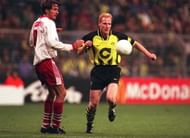The same story was repeated the next season. Sammer was now acknowledged as the successor to the great Franz Beckenbauer. Like ‘The Kaiser’, Sammer too was accomplished in very facet of the game. He was built like Beckenbauer too. He had a slight frame and swift feet. He was a brilliant tackler, made plenty of interceptions each game, scored crucial goals, stopped oncoming forwards and set his own team in motion. He was quick with the ball on his feet and had bags of stamina. Not only all this, he was a leader on the field too. He inspired his team with his game and always had an eye out for any oncoming danger. In 1995, 1996 and 1997 he was named as German footballer of the year.
In the 1997 UEFA Champions League, Borussia Dortmund were the underdogs. Yet the world watched in amazement at the way they swept away one opponent after another. Other teams, even teams who played the 3-5-2 were not accustomed to playing against a libero, and after beating Manchester United, Dortmund set a date for the finals with Juventus. Sammer was outstanding that night. Having seen the DVD of the match, I can claim that I have never seen a player perform better in a major final. He did not score any goals or set up others to score but was omnipresent when his team attacked. While going back he made tackles, used his physicality and kept breaking up Juventus’ game. He made crucial interceptions and launched perfect passes out onto the wings. The world remembers the heroics of Lars Ricken, Paul Lambert and Riedle, but Sammer for me was the hero of the night.
The zenith of his career though came in 1996 Euros. He was deployed as a libero by national coach Berti Vogts. Vogts had played alongside Beckenbauer and knew first-hand how a libero could influence a team. There were calls to use Lothar Matthaus instead of Sammer, but Sammer’s performances silenced his critics. He was always present to compliment his defense, but was on hand to score too. He was brilliant with the ball at his feet and often made adventurous runs across the field. It was one of these late surges that he scored the winner against Russia in their second match in the group stage.
However it was in the quarterfinals that Sammer showed what he really was capable of. He spent the early part of the match fending off Croatian attacks and was unable to get out of his own half. But suddenly he got hold of the ball and made one of his trademark runs which earned his team a penalty. Klinsmann converted it but Crotia soon equalized. It was only fair that the sweeper who had imposed himself on the game wins it too. Sammer made a Lampard-esque run and converted a Markus Babbel cross with an excellent header to win the match. In the final though he showed he was human, as he unnecessarily brought down Pobrosky of the Czech Republic and conceded a penalty. He was saved the blushes when Oliver Bierhoff’s brace carried them to the cup. It was the only black mark for Sammer in a tournament he was the star of. He was given the ‘Player of the Tournament’ award and he became the only defender after Beckenbauer to get the Ballon D’ Or.
Tragedy though had to strike and in the 1998 season a routine knee operation went wrong and caused Sammer to end his career. In 1999 Sammer retired and at the young age of 32 the game was devoid of a talent that comes across very rarely.
For me the abiding image of Sammer’s career has to be the image which gave him the name ‘Iron Matthias’. Playing against Borussia Mongdengladbach, Sammer suffered a cut above his eye. He asked the medical staff to staple it and continued to play the game without painkillers. This really defined the man. He was one of the players for whom playing was the most important thing. He was brave, competitive, skilled and intelligent. He is the most complete footballer I have seen play. Although most of today’s fans would not remember him, but true aficionados would wish that they could see another man who could play like Sammer.

